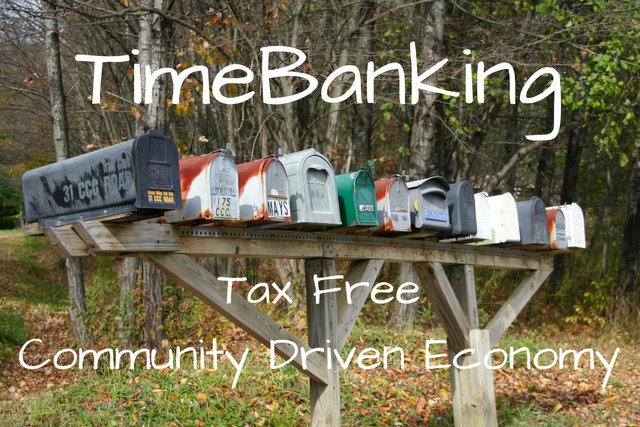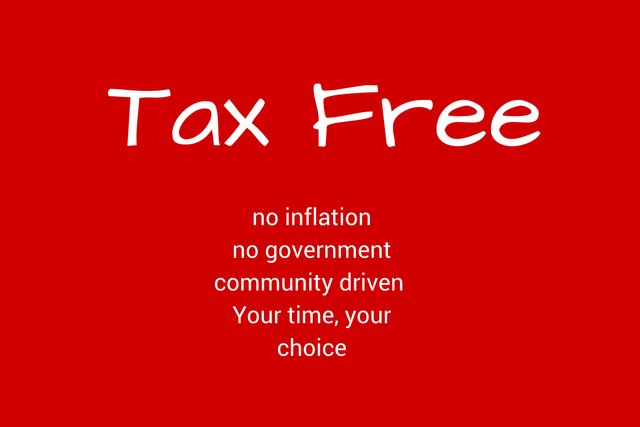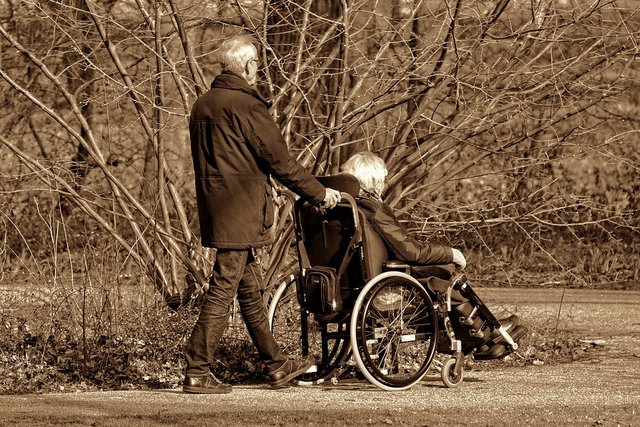TimeBanking: Alternative Community Driven Economies

Have you heard about TimeBanking?
Imagine being able to trade your skills for services you need, with no exchange of money.
As homesteaders we often seek out barter and trade deals but it can be challenging to find like minded people. An organized economy based on the age old principles of fair trade and community would be ideal.
Cash currency is very useful not to mention convenient, and we all need a bit of money but diversification is key because our entire life savings can be taken away with the click of a button. Just look at what happened in Venezuela as one example. If that's not enough you can then look at: Cyprus. India. Argentina. I won't get into the dire unemployment situation in North America, we all know things aren't pretty. It all boils down to the fact that cash is fragile.
So here I am trying to figure out some alternative ways to build an income stream for the homestead and imagine my surprise when I learned about TimeBanking, a community driven alternative economy AND even more surprising, we have one in our area!
What is TimeBanking?
TimeBanking is an alternative, time-based currency that lets you contribute a skill or talent in exchange for services from other members of the time bank network. One hour of help of any kind given to another member earns you one time credit. Your time credit is exchangeable for an hour of help from any member in the community. It's all about reciprocity.
It's also a way to connect and build strong communities and connections. It re-awakens the concept of caring about your neighbours and your community. With a TimeBank system in place people can be rewarded for the community services that they provide (something that often goes unrecognised).
One equals one.
It really is that simple.
"Every capacity that has enabled our species to survive, such as caring for each other, trusting each other, relying on each other, has become excluded from our economic system," Cahn says. "And I realised that there was no way we were going to build communities we wanted to live in if we didn't completely reassess our value system and start rewarding human as well as financial contributions."~ Edgar Cahn, Founder of Time Banking
How it Works
When you spend an hour doing something for a member, you earn a time dollar. You can use that time dollar to buy an hour of another member's time. Members use a web based system to advertise what they want to give and receive, and to track the time dollars going in and out of their time bank accounts.
You will have to register with your local group to become a member. There is no fee for registering.
It's more than meets the eye
When you think about it, time banking is a way to build connections and become part of a true social network. You meet new people and engage in the community more. A strong community can make it through the hardest of times.
It's empowering because you aren't dealing with tax, over inflation and other government systems. You decide what services you want to provide and when you want to provide them.

Directory of Time Banks
There are time banks in more than 25 countries. If there isn't one in your community you can set one in motion. You can look up and see if there is a time bank in your town/country here. There are also guides on starting your own time bank in this website.
http://community.timebanks.org/
Services
The services available depend on the skill diversity of your community/network. It can include just about anything:
Trades (carpentry, plumbing, electrical) Transportation (airport, doctors visits), budget and tax preparation, child and pet care, shopping, minor home repair, house painting, holistic therapy (massage, acupuncture), mending and alterations, computer & technical services (web design, repairs, etc) garden/yard work, farm help, moving assistance, cooking, cleaning, private lessons, classes and tutoring, editing, translating, companionship, dental services, professional services (business consulting) and so much more!
When you start listing all of the different types of things you have to offer your community, it's really empowering. All of sudden your skills that aren't being valued in the modern financial world have value.
 source TimeBanking rewards people for caring for elders, and providing services that nurture and keep the community strong.
source TimeBanking rewards people for caring for elders, and providing services that nurture and keep the community strong.
The Five Core Values of TimeBanking
Edgar Cahn is the founder of timebanking put some specific core values in place for TimeBaking.
Asset
Every one of us has something of value to share with someone else.
Redefining Work
There are some forms of work that money will not easily pay for, like building strong families, revitalizing neighborhoods, making democracy work, advancing social justice. Time credits were designed to reward, recognize and honor that work.
Reciprocity
Helping that works as a two-way street empowers everyone involved – the receiver as well as the giver.
The question: “How can I help you?” needs to change so we ask: “Will you help someone too?” Paying it forward ensures that, together, we help each other build the world we all will live in.
Social Networks
People are stronger when they are part of a community network. by helping one another we build communities of support, strength & trust. Community is built by planting roots, building trust and creating networks.
Respect
Respect underlies freedom of speech, freedom of religion, and everything we value. Respect supplies the heart and soul of democracy. We strive to respect where people are in the moment, not where we hope they will be at some future point.
Its time to take a stand that says we cannot let a monetary system that seems to perpetuate privilege and perpetuate disparities continue unchallenged. We need a system that begins to honour what every human being can do. We don’t lack the ability to produce, we lack the ability right now to effectuate distribution and to enable people to define themselves as contributors. I think that Timebanking long ago took a stance that it could not let the monetary system, as important and even as useful as it is, to define and be the exclusive definition of who is valuable and what it means to give. I think as long as we lack a second currency that can honour that, we are lacking a critical tool that we need.
~ Edgar Cahn, Founder of Time Banking
A New Paradigm
This model is quite contrary to what many of us have been taught about skills and value in our society. You have to be willing to let go of the system of rating skills by "monetary value".
If for example you are a lawyer accustomed to making $100 an hour and you are exchanging an hour of your time for an hour of babysitting, you have to be able to see this as an equal exchange. A service for a service. In this system your service is not worth more, and theirs less.
An hour for an hour. Simple as that.
If you can't get behind that concept them this model will quickly become frustrating and unsuitable for you. Just remember this. We all have a finite time in which to live our lives. Time is in fact the most valuable currency of all.
So, what do you think. Is this something that you would entertain becoming involved in? Have you used or do you currently use a timebank? What do you think of it? What has your experience been with it?
Building a greener, more beautiful world one seed at a time.
Homesteading | Gardening | Frugal Living | Preserving Food| From Scratch Cooking|
You can also find me at: walkerland.ca | Facebook





First up, I have heard of projects like these in different cities (I'm from Maine and I saw years ago there was a time bank project in Portland), and I absolutely love it. As someone who struggles with 'normal' vocation standards, I wrestle with the idea of how we are valued, how we decide who 'deserves' food, housing etc. It is so true, that many of us provide emotional value and 'work' to our communities that is hard or feels strange to try and monetize. That being said there are obvious flaws in the hour for and hour model. We can list many examples but time is not our only finite resource, we also have limited physical and emotional stamina and some things are just more intensive. As someone who did deep tissue injury massage for ten years and suffered for 3 years with a back injury that rendered me effectively disabled for a while, I now that doing an hour of that work costs both time, x amount of physical stamina (PS) and x amount of emotional stamina (ES), compared to babysitting which has the same time cost yet different PS and ES costs.
If we decouple from money completely and doctors didn't have money debt (because the teachers were teaching 'for free' as their deposits in the time bank ) then we would have to look at their studies as deposits in the time bank. Three hours in anatomy lab = a deposit. We might say they would come into being a physician with a large amount of time owed to them, and that is why their services cost more in the money world. But, if their needs were being met while they studied instead of having to also work or borrow, then that debt may be insignificant, or at least greatly reduced. Each person has different abilities and some may prefer mentally taxing work and others physically taxing work, and I love the Venus project founder Jacque Fresco's philosophy that if everyone did what they were passionate about, then it would feel more even- more people would have joy in their day to day and we all would benefit from having the best quality everything in our society.
What I love most about movements like this is that by starting at the most basic ideas of trade, we are actively going through the ideas that have been developed around trade and markets and valuation and seeing which ones are truths and which ones are baggage we just keep around due to not asking questions. That is the best part about crypto movement and platforms like this: we are clearing the slate and consciously rebuilding step by step. We are aware that many ideas inherent in our economic view were imposed on us by people who wanted to created power imbalances in their favor, and we can find out where those imbalances are through logical group discussion.
If may feel like giving things not only time but ES and PS values would just create that same system of competitive deserving , but if we take into account technology that piece wouldn't be as hard to fix. One person can grow food for many, if houses and cars and other items were built to our highest technological capabilities, the amount of hours needed to have these items (not to mention if we went to total shared resources for some- such as vehicles) is greatly reduced, so although overseeing the construction of a house might require more weight per hours, there would be less of an incentive to build things to break just to find an excuse to build them again.
Thank you for this really well written outline and for keeping this discussion going, we NEED to be having this, and I think we will be moving into these new ways of viewing 'work' and trade more and more with the advent of all of these coins as way to facilitate community trading <3
We already intuitively have fluid value within families and friend groups, we just will come to the same roadblocks to scaling that people hit when they first started trading with different civilizations and even earlier intertribal trade. Ecah revolution and workers right movement had a hand in revising. We can now have transparency due to magical internet communication, so hopefully it getsharder and harder for certain powerful groups to manipulate :)
Wow @kilbride, that you for such a thoughtful and detailed response. You've raised a lot of great points. I've just started the registration process to join our local group and I think the act of actually participating will quickly highlight how we feel about the model.
I can't agree more with this:
We really believe in diversifying as much as possible so that if one system fails, we have others to fall back on. I am pretty excited that we have an opportunity to explore timebanking!
Keep us posted! And like you said, this is not a mainstream version of the project, so its not really necessary to be overly critical. It is just a way for people possible facilitate some productivity, plus, get people participating in the ideas behind it more. I hope you do some follow up posts!
I don't think it's entirely practical as long as people like lawyers and doctors have to go five and six figures into debt to acquire specialized skills. That up front makes their skill "more valuable" than that of the 13 year old babysitter. How are they going to recoup their education costs under the time bank system?
Where I see time banking working for professionals like that is in regard to pro bono and after-hours work. But then for doctors, what happens if there is a malpractice issue? Are they considered "on the clock" for insurance purposes or will they be entirely on the hook if a patient accuses them of doing something wrong? If I was a doctor I might be leery of exposing myself to somebody looking for an easy lawsuit target.
I think it's a great idea, I just don't see it going mainstream for those reasons (edit: unless some of that other baggage is removed first.)
I don't see this as a mainstream option either, but it is a good way to diversify and build up your community. I don't expect many doctors to jump on this, they aren't exactly worried about money or looking for alternative monetary system to support themselves. Those that are trying to find ways to insulate themselves, that are not in the top tier of earners, or have a passion to build tighter communities and live a more "off grid" life are more inclined to take an interest in something like this.
I'm really interested in giving it a try. I've registered and need to attend an orientation and then we'll see how it goes.
I'll be very interested to see how it goes. Personally I think it would be great if the concept spread, and people were able to become more independent as a result. Unplugging from the big central "system" as far as banking, and no longer being vulnerable to hiccups in the national economy, sounds pretty good :)
It really does sound good and it merits exploration!
There are some aspects of this model that have the potential/risk to mirror communism so I do see flaws that will prevent this "as it stands" from becoming more mainstream.
Society and humans are very complicated and I suspect the value of this system depends heavily on the characteristics of the members of your community and how well you fit into that. I am eager to dive in and find out.
What skills are you going to offer to the time bank?
I agree that that's a fact from what I've seen in action. People tend to do it voluntarily on a small scale anyway; I've seen ongoing "you do my hair and nails for free, I'll babysit your kid" type arrangements, for example. But I've also seen cases where, say, one neighbor helpfully plows the street every time it snows and the other neighbors are content to enjoy his efforts without actively reciprocating. It will be interesting to see how well it's working in your area!
We aren't really part of a neighbourhood or community, where we live there isn't a community centre or gathering area and people are so wide spread. Some of them work two hours away so you never really meet.
I hope that this will help us meet some like minded people that live within a reasonable distance. :)
I'm still thinking about what we'll offer. Website work, computer help, canning/preserving classes, business consulting/proposal writing ... not sure.
Yes, that's a great idea, we even published a series of articles in Space of Love magazine about this alternative. )
Ok... this sounds VERY interesting and intriguing. AND definitely something I want to read and learn more about.
I have never heard of it but am definitely interested in possibly getting involved with.
Using ones skills to barter, get services or what you are in need of is exactly how things were done before currency became a concrete thing. Everything was abstract... barter and trade.
This post actually made me smile and think.
Glad you liked it @goldendawne. The concept really does align well with the "old world" ideals that my husband and I seem to gravitate towards. I've got to wait for an orientation to sign up fully but I was able to peek at some of the listings and it's really becoming more and more intriguing.
All of a sudden those skills we've pushed to the side because they don't fit this life are possibly relevant and beneficial to us again and perhaps I can indulge in something that I can't really be spending money on like a massage or yoga class in exchange ... that to me is so cool! There's just so much potential.
Isn't highly skilled labor legitimately more valuable than unskilled labor? Shouldn't a heart surgeon make more per hour than a ditch digger?
It's a valid point, one that we debated ourselves. That said, we need something new and this is a step in the right direction, even if it is not entirely equitable. It's also an opportunity for someone with highly sought after skills to knowingly undersell their services in a conscious effort to help strengthen their community (and maybe build one in the first place.)
I had missed an important point on my intial read-thru:
Before I had noticed that, I wondered what differentiates time banking from any other currency? While there are details that would differ even it wasn't time-backed, as soon as you start weighting the value of the service per unit time, you lose a lot of what makes this fundamentally different. Having said that, I don't know if it will succeed, but it's certainly interesting and I'm inclined to root for it.
Now we are working on to refresh #Timebanking with #blockchain technology as the continuity of Clonakilty Favour Exchange – Community Timebank
We tried many times in different countries with some results.. but now is the time when everything is ready and #Ireland is a good place for this. Mostly the West Cork region.. Follow me to stay informed ;)